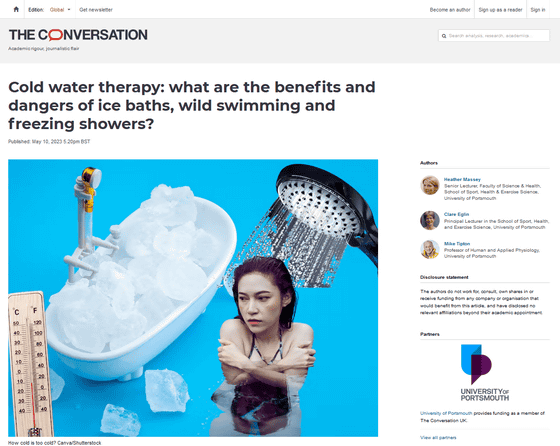``Cold water therapy'' that takes a cold water bath adversely affects health

There is a theory that ``cold water therapy'', which involves swimming in cold rivers and lakes after exercise or taking a cold bath with ice, has the effect of reducing muscle pain and speeding up recovery, and athletes are actually adopting it. There is also a case. However, in reality, cold water can have a harmful effect on the human body, explains Heather Massey, a lecturer at the Department of Sports Health and Exercise Science at the University of Portsmouth.
Cold water therapy: what are the benefits and dangers of ice baths, wild swimming and freezing showers?
https://theconversation.com/cold-water-therapy-what-are-the-benefits-and-dangers-of-ice-baths-wild-swimming-and-freezing-showers-203452

Various studies have validated the claim that cold water baths are effective for post-exercise recovery, but a study published in 2014 concluded that ``no significant effects were observed, and no significant effects were seen beyond the placebo effect .'' No.'
In addition, a 2022 study points out that cold water bathing is rather associated with the risk of respiratory injury, cardiovascular injury, and in some cases, peripheral neurovascular injury, and a sudden drop in skin temperature can lead to hyperventilation and hyperventilation. It seems that there is also a possibility of causing 'cold shock', which causes respiratory failure due to the release of stress hormones, arrhythmia, etc.

When people are exposed to the cold, they often feel coldness and numbness in their hands and feet, and tingling when they warm up. This is a temporary symptom, but prolonged exposure to low temperatures can damage nerves and blood vessels, causing this numbness and pain to become chronic. Also, due to damage to blood vessels and nerves, the tissue of the fingertips may be severely damaged and necrotic.
There is a big difference in how sensitive people are to such coldness. A study published in 2018 found that people from Africa and the Caribbean tend to be more susceptible to cold injury. A study of swimmers who normally swim in cold water found that swimmers tended to be more sensitive to cold, but this was not associated with susceptibility to skin vascular injury. was shown. In other words, it can be said that there is no relationship between sensitivity to cold and susceptibility to cold injury.

Massey et al. urge you to consider the following when trying cold water therapy:
・Consult your doctor in advance to confirm safety.
・Make sure that you are not alone and that the place where you take a cold bath is safe. If outdoors, consider the possibility of currents, tides, contamination, obstacles, and dangerous creatures.
Plan in advance how to get in and out of cold water safely, as the cold can weaken muscles and make your hands and feet feel numb.
・After finishing the cold bath, prepare a method to warm the body, such as a towel, dry clothes, a windbreaker, and a warm drink. Avoid driving a car or riding a bicycle until your body is completely warmed up.
Keep cold baths short and get out before experiencing numbness, pain, or shivering.
Related Posts:
in Science, Posted by log1i_yk







